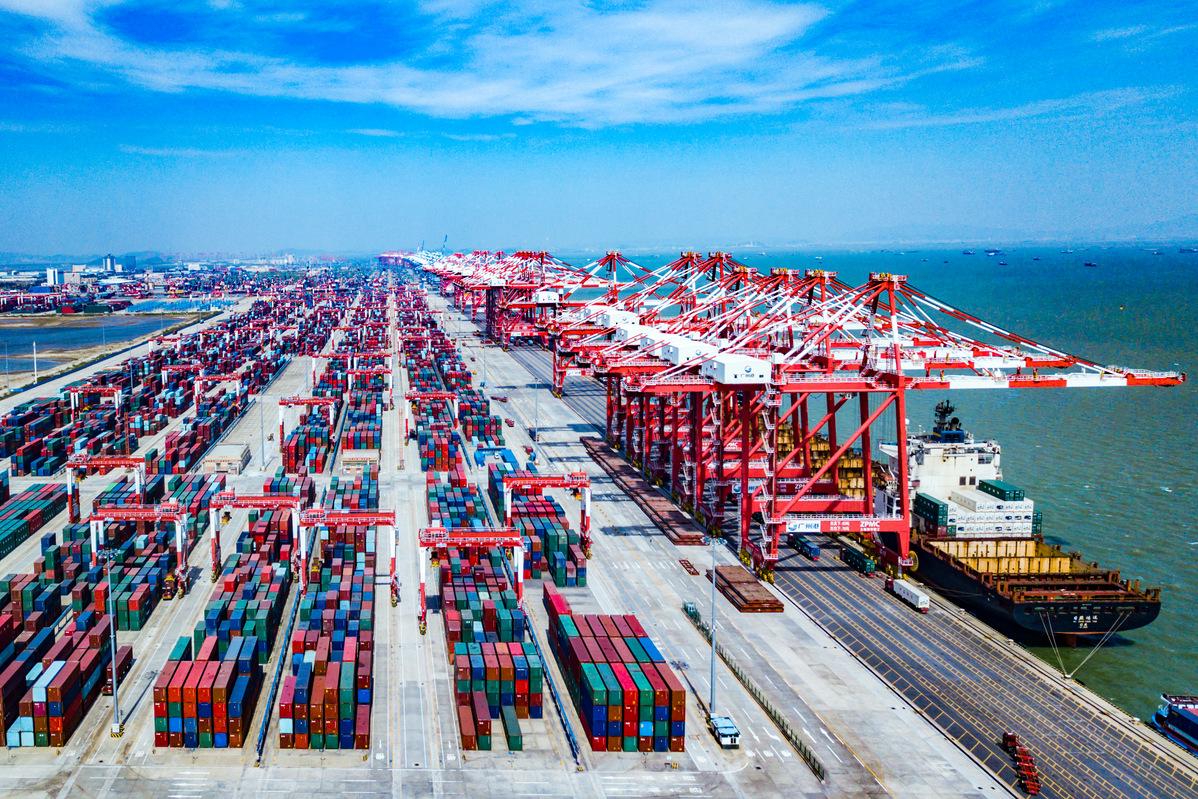
Photo shows a view of Nansha Port in Guangzhou, South China's Guangdong province. [Photo provided to chinadaily.com.cn]
Despite growing external challenges and uncertainties, China's exports will remain resilient and dynamic in 2025, bolstered by a diverse product range, flexible growth drivers and a stable, multifaceted market, said government officials and exporters on Monday.
Addressing a news conference in Beijing, Wang Lingjun, deputy head of the General Administration of Customs, said that Chinese-manufactured products are in high demand worldwide, driven by a strong and continuously evolving industrial system and sustained investment in innovation.
China's established manufacturing supply chain will play a crucial role in maintaining the stability of global production and supply networks, while driving technological progress and industrial upgrades across the world, Wang said.
The total value of China's foreign trade reached a record high of 43.85 trillion yuan ($6 trillion) in 2024, marking a 5 percent year-on-year growth, customs statistics showed.
The country's exports amounted to 25.45 trillion yuan last year, an increase of 7.1 percent year-on-year, while imports totaled 18.39 trillion yuan, a 2.3 percent rise compared with the previous year.
In the fourth quarter of 2024, China's exports grew 9.2 percent year-on-year, marking an acceleration of 2.9 percentage points compared with the first three quarters, according to the GAC.
This not only reflected the continuation of a long-term positive trend but also demonstrated the effectiveness of recent policy implementations, said Lyu Daliang, director of the administration's department of statistics and analysis.
Liang Ming, director of the Institute of International Trade, which is part of the Chinese Academy of International Trade and Economic Cooperation, said that China's advantages include the expanding share of electromechanical products in total export value, the fast development of industrial clusters for tech-intensive green products, the rapid growth of cross-border e-commerce businesses, and the growing interest of exporters in digital and green trade. These factors will help strengthen the foundation of China's foreign trade growth this year, Liang added.
To address challenges such as the rise of unilateralism and potential disruptions in global supply chains, China is likely to introduce new policies to stabilize foreign trade in 2025, said Liu Xiangdong, a researcher at the Beijing-based China Center for International Economic Exchanges.
These policies, particularly in areas like fiscal policy and financing, will focus on strengthening support for foreign trade companies, Liu added.
As many international organizations predict moderate global trade recovery in 2025, with emerging economies driving trade growth, he said this will help China diversify its trade partners, increasing emerging markets' share in foreign trade and effectively mitigating uncertainties and risks associated with changes in traditional markets.
In a testing workshop of Jiangsu Newamstar Packaging Machinery, a manufacturer of packaging machinery for liquids in Zhangjiagang, Jiangsu province, workers conducted the final pre-shipment adjustments earlier this month on a bottle blowing-filling-capping machine.
Within just one minute, 433 bottle preforms can be transformed into beverage bottles. A beverage packaging production line corresponding to the machine will be shipped to the client's plant in India. All the machines will be installed, adjusted and put into production before the peak beverage sales season.
"We have exported more than 2,200 production lines to over 80 countries and regions globally to date," said Yin Gang, a manager at the company's marketing unit. Yin added that the company plans to invest further in innovation and expand its markets in the Middle East, South Asia and Southeast Asia this year.
China saw growth in exports to more than 160 countries and regions in 2024, including a 9.6 percent year-on-year rise in exports to economies participating in the Belt and Road Initiative, and a 13.4 percent year-on-year increase to the Association of Southeast Asian Nations, according to the GAC.
In addition, Chinese exports to the United States grew 6.1 percent year-on-year, while those to the European Union grew 4.3 percent.